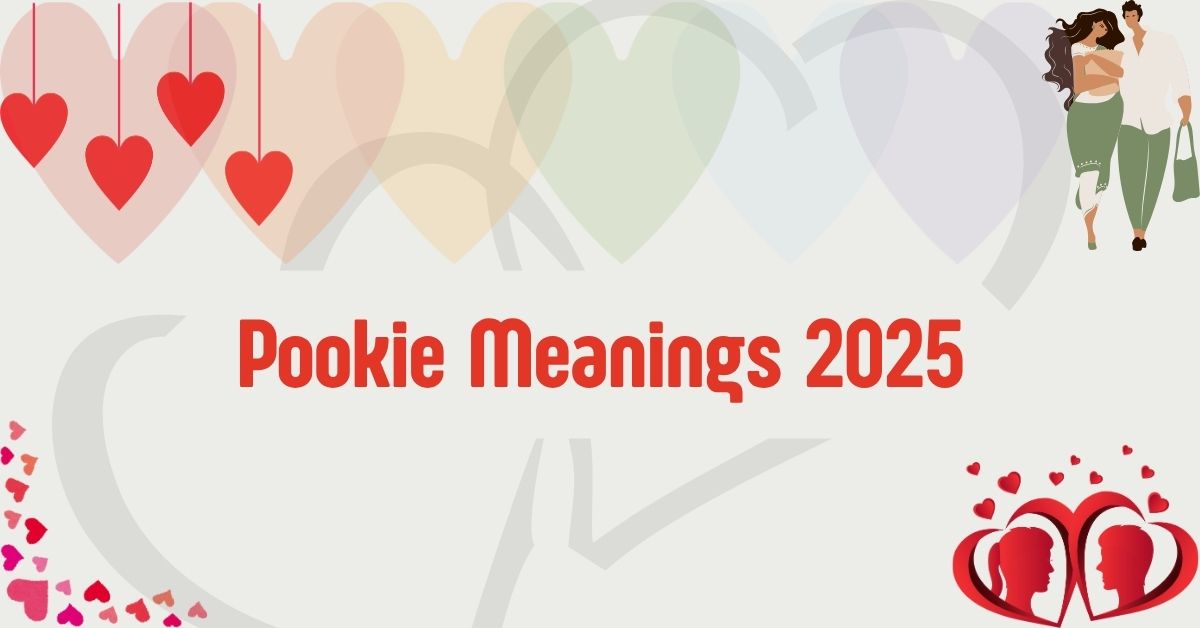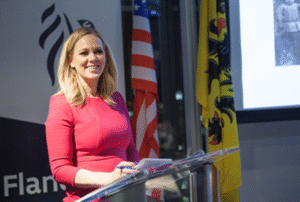“Pookie” has become America’s favorite term of endearment, dominating TikTok and everyday conversations. Primarily used as a nickname for loved ones, close friends, or someone adorable, this versatile term conveys affection across romantic relationships to casual friendships.
Gen Z has revolutionized pookie’s meaning, transforming simple slang into powerful relationship language that expresses genuine closeness and emotional connection.
What Does Pookie Mean?
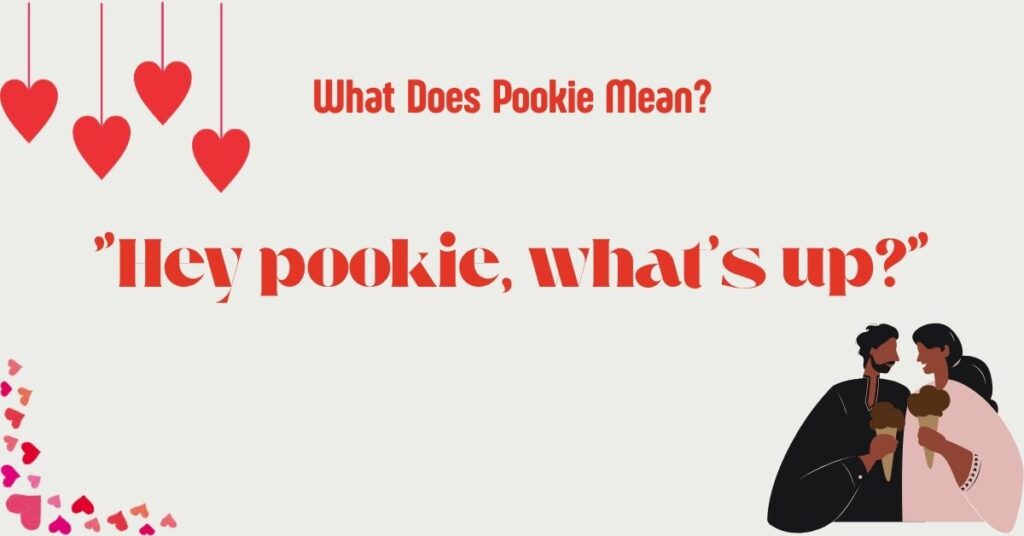
Understanding the core pookie meaning requires examining its multifaceted nature in modern American culture.
This term has transcended traditional boundaries, becoming a versatile expression of affection that resonates with millions of users across different demographics and social platforms.
The slang has gained tremendous traction through social media, particularly TikTok, where influencers and everyday users incorporate it into their daily vocabulary.
Its popularity stems from its inherent sweetness and the emotional connection it creates between people.
| Context | Meaning | Usage Example |
| Romantic | Term of endearment | “Good morning, pookie!” |
| Friendship | Casual affection | “Hey pookie, what’s up?” |
| Family | Loving nickname | “Come here, pookie” |
| Social Media | Trendy expression | “#pookie vibes” |
Historical Evolution
The term’s journey from niche nickname to mainstream phenomenon reflects broader changes in how Americans express affection.
Originally appearing in urban dictionary definitions, pookie has evolved into a culturally significant expression.
Modern Significance
Today’s pookie meaning encompasses emotional intimacy, playful affection, and social connection.
It represents a shift toward more casual, accessible forms of endearment that transcend traditional relationship boundaries.
More Post: Ofc Meaning?: Your Complete Guide to Text Abbreviations
1. Pookie as a Nickname
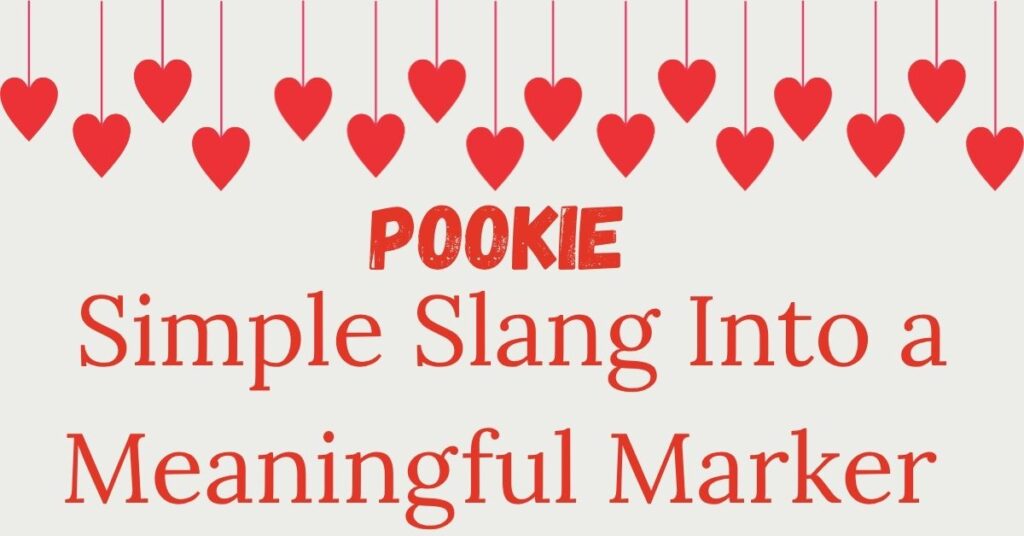
Pookie functions as a deeply personal identifier that creates unique bonds between individuals.
This usage transforms the term from simple slang into a meaningful marker of special relationships, whether romantic, familial, or platonic connections.
When someone becomes your “pookie,” they’ve earned a special place in your emotional landscape.
This nickname often develops organically through shared experiences, inside jokes, or mutual affection that naturally evolves into this endearing label.
Personal Identity Connection
Nicknames like pookie become integral to personal relationships, creating insider language that strengthens emotional bonds.
They serve as verbal shortcuts to express complex feelings of affection and closeness.
Relationship Markers
Using pookie as a nickname signals relationship progression and emotional intimacy. It indicates comfort levels and mutual understanding between individuals who share this special terminology.
2. Pookie as a Term of Endearment
The romantic pookie meaning represents one of its most powerful applications, particularly when expressing deep affection in love relationships.
This endearing term carries emotional weight that strengthens romantic connections and creates intimate communication patterns.
Gen Z has particularly embraced pookie as a romantic expression, using it to convey feelings that traditional terms might not capture.
It represents modern love language that feels authentic and personally meaningful.
Emotional Expression
Pookie serves as a vehicle for expressing complex romantic feelings in simple, accessible language. It bridges the gap between casual friendship and deep romantic connection.
Relationship Bonding
When used romantically, pookie creates shared language between partners that reinforces their unique connection and strengthens their emotional bond through consistent affectionate communication.
See Also: PMO Meaning: Unlock What It Stands For in Text and Conversations 2025 Complete Guide
3. Pookie in Texting
Digital communication has revolutionized how we use endearing terms like pookie, with texting platforms serving as primary venues for this expression.
TikTok and messaging apps have amplified its usage, making it a staple of modern digital conversations.
The pookie meaning in texting often carries different connotations than face-to-face usage, allowing for more casual application while maintaining its affectionate core.
Text-based pookie usage has become particularly popular among younger demographics.
| Platform | Usage Style | Frequency | Context |
| Text Messages | Direct address | High | Personal conversations |
| Social Media | Comments/captions | Medium | Public affection |
| Dating Apps | Flirtatious | Low | Early relationship |
| Gaming Chat | Casual friendship | Medium | Community bonding |
Digital Intimacy
Texting pookie creates emotional connection across physical distances, allowing people to maintain affectionate relationships through consistent digital communication and shared language.
Generational Preferences
Gen Z particularly embraces textual pookie usage, incorporating it into their natural communication patterns and making it a defining characteristic of their digital relationship style.
4. Pookie as an Expression of Caring
Caring pookie meaning emerges during vulnerable moments when someone needs emotional support or comfort.
This application demonstrates the term’s versatility in expressing nurturing feelings and genuine concern for others’ wellbeing.
Whether someone’s feeling unwell, stressed, or going through difficult times, using pookie conveys emotional support and creates a sense of safety and comfort in challenging situations.
Nurturing Communication
Pookie becomes a verbal hug during difficult moments, providing emotional comfort and demonstrating care through gentle, affectionate language that soothes and supports.
Emotional Support
Using pookie during caring moments strengthens emotional bonds and shows genuine concern, creating deeper connections through consistent supportive communication patterns.
5. Pookie as a Casual, Fun Expression
The lighthearted pookie meaning represents its most accessible application, where the term serves as playful banter without deep emotional implications.
This casual usage makes pookie approachable for various social situations and relationship types.
TikTok has particularly popularized this casual application, where users incorporate pookie into everyday conversations without necessarily implying romantic or deep emotional connections.
Social Accessibility
Casual pookie usage breaks down barriers in social interactions, making conversations more approachable and creating friendly atmospheres in various social contexts.
Playful Communication
This application allows people to express mild affection or friendliness without overwhelming social pressure, making it perfect for acquaintances and casual friendships.
Exploring Alternatives to “Pookie”
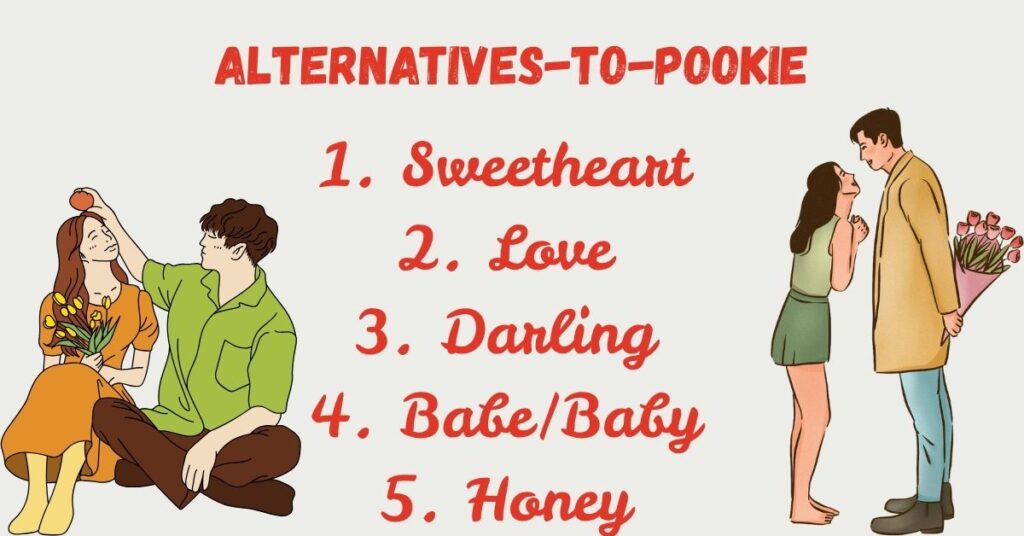
Finding the perfect alternative to pookie depends on your relationship dynamics, personal preferences, and desired emotional impact.
These alternatives offer varying levels of formality, intimacy, and cultural significance to match different communication needs.
Understanding these options helps you express affection authentically while respecting individual preferences and relationship boundaries.
Each alternative carries unique connotations that can enhance your communication effectiveness.
Selection Criteria
Choosing pookie alternatives requires considering relationship type, cultural background, personal comfort levels, and the specific emotional message you want to convey through your chosen term.
Cultural Considerations
Different alternatives may resonate differently across cultural backgrounds, age groups, and regional preferences, making it important to understand your audience when selecting endearing terms.
1. Sweetheart
Sweetheart represents a timeless classic that transcends generational boundaries while maintaining elegance and sophistication.
This alternative works exceptionally well in both romantic and platonic contexts, offering versatility without sacrificing emotional impact.
Unlike pookie’s modern slang origins, sweetheart carries historical weight and cultural acceptance that makes it appropriate for various formal and informal situations.
Traditional Appeal
Sweetheart’s enduring popularity stems from its classical charm and widespread cultural acceptance, making it a safe choice for conservative or traditional relationship dynamics.
Versatile Application
This term works effectively across different relationship types, from romantic partnerships to family connections, providing flexibility in various social contexts and situations.
2. Love
The simple yet powerful term “love” offers directness and emotional clarity that pookie sometimes lacks. This alternative provides straightforward affection without playful connotations, making it suitable for serious emotional expressions.
British influence has made “love” increasingly popular in American casual conversation, particularly among younger demographics who appreciate its casual intimacy.
Emotional Directness
“Love” cuts straight to the emotional core without ambiguity, making it perfect for moments requiring clear affectionate expression and genuine emotional communication.
Cultural Flexibility
This term transcends cultural boundaries and age groups, offering universal appeal that works effectively across diverse social contexts and relationship types.
3. Darling
Darling brings sophisticated elegance to affectionate communication, offering vintage charm that appeals to those seeking refined expression.
This alternative works particularly well for individuals who appreciate classic romantic language.
The term carries cultural weight and literary associations that elevate conversations while maintaining genuine warmth and affection.
Sophisticated Charm
Darling adds elegance to conversations, making it perfect for individuals who prefer refined communication styles and appreciate classical romantic expression.
Literary Connection
This term’s literary heritage creates romantic associations that enhance emotional communication through culturally rich language and sophisticated expression patterns.
4. Babe/Baby
Contemporary romantic standards often include “babe” or “baby” as primary terms of endearment, particularly in intimate relationships.
These alternatives offer modern appeal while maintaining strong emotional connection.
Gen Z has embraced these terms as relationship staples, using them to express romantic affection and intimate connection in both casual and serious relationships.
Modern Romance
Babe/baby represents current relationship language that feels authentic to contemporary couples and aligns with modern communication preferences and romantic expression.
Intimate Connection
These terms create immediate emotional intimacy and signal romantic interest, making them powerful tools for expressing deep affection and relationship commitment.
5. Honey
Honey combines sweetness with universal appeal, making it one of the most beloved alternatives to pookie.
This term works across all relationship types while maintaining genuine warmth and affection.
Southern American traditions have particularly embraced honey as a standard term of endearment, spreading its usage throughout various regions and cultural groups.
Universal Sweetness
Honey’s natural sweetness creates immediate positive associations, making conversations more pleasant and demonstrating genuine care through food-based metaphorical language.
Regional Comfort
This term feels particularly comfortable in Southern contexts while maintaining broad appeal across different American regions and cultural backgrounds.
Frequently Asked Questions
What does “pookie” actually mean?
Pookie is an affectionate nickname expressing warmth, closeness, and endearment in romantic relationships, friendships, and family connections across America.
Is “pookie” a cute word?
Yes, pookie is considered an adorable, playful term that conveys sweetness and affection in casual, intimate conversations between people.
Can I call someone a pookie?
You can use pookie with close friends, romantic partners, or family members who appreciate affectionate nicknames and casual endearments.
Does pookie mean vigana?
No, pookie doesn’t have any anatomical meanings. It’s simply a sweet, innocent nickname used to express affection and closeness.
When a girl calls you pookie?
When someone calls you pookie, they’re showing affection, comfort, and closeness, indicating you hold a special place in their heart.
Is “pookie” an insult?
Pookie isn’t an insult; it’s a positive, affectionate term expressing love, friendship, or endearment in personal relationships and conversations.
Conclusion
The 2025+ pookie meaning encompasses diverse interpretations from romantic endearment to casual friendship expression. Understanding context, alternatives, and appropriate usage helps Americans navigate modern relationship communication effectively. Embrace authentic expression while respecting boundaries and cultural sensitivities in your personal connections
